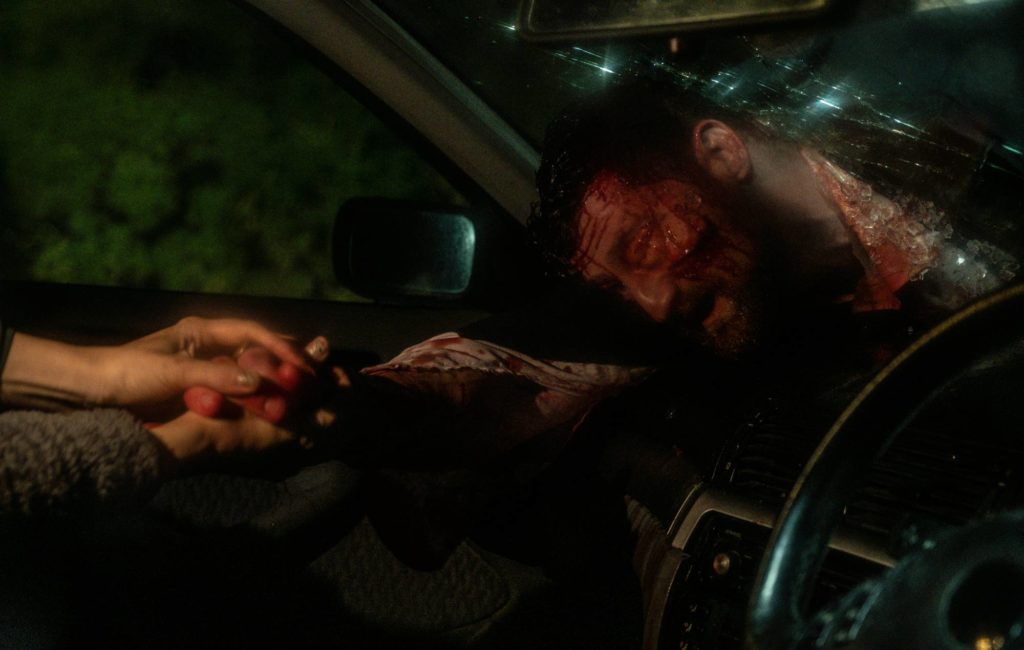
Dashcam: Shit, Oh Man!
There are times when a movie strikes all the wrong chords and manages a bit of notoriety before fading from the fickle online discourse. The urge to hate on something can be very real indeed. But why draw attention to something you’d much rather see fade out of public consciousness altogether? Paradox!
I mean, think about it: in our modern contrarian society, people seek out and champion movies especially if you give them bad reviews!
Maybe it was the late hour. Maybe it was the acid-reflux gurgles of controversy surrounding star Annie Hardy. Maybe it was the hype of the sophomore effort from the team behind Host. Maybe it was all and none of these things, but Dashcam has compelled me to write a review. Lucky you?
The First Fish to Grow Legs
During the post-Paranormal Activity era, Found Footage ruled the horror landscape: cost, ease, and the ability to use unknown actors equaled guaranteed box-office success. And, as with all trends, it’s not surprising that the worst of this subgenre simply cribbed from its better-known forebears.
Then along comes Rob Savage’s Host. Through Shudder’s unflappable marketing machine, the film sparked a burst of online chatter during its premiere, only to quietly fade from the conversation. Maybe because its execution felt more calculated than a Found Footage film should; or maybe because its use of the COVID-19 lockdown felt like a flimsy bit of added “social relevance.”
Many liked Host. I found it rather “meh.”
But that film seems like the first fish to grow legs and walk on land compared to Dashcam, Savage and writer Jed Shepherd’s follow-up.
Little Intolerable Annie
If Host took the pandemic seriously enough to tell its tale through Zoom screens, then Dashcam is the stark opposite: Hardy (playing herself) is a distinct creation of the social media age – a willfully defiant spewer of alt-right cliches who treats every interaction as a piece of low-grade performance art, and every provocation as an opportunity to cry OPPRESSION.
The ugliness of American political debate is nothing new. It has always veered into superficial personal attacks and dumbed-down discourse on Key Issues. I would argue that the accessibility and convenience of social media has greatly minimized “debate” on a conceptual level. Case in point: I’m as guilty as anyone else of reacting to something based on a headline, or the provocation of a factually dubious viral tweet.
And never mind that my politics stand in sharp contrast to her character’s, but Hardy’s mere presence is an endurance test that far eclipses any of Dashcam’s horror elements. Within minutes, I’d had enough of her in-your-face contrarian attitude, and the filmmakers’ insistence on allowing her to literally freestyle through the production.
But in all fairness, none of the characters in Dashcam grow, change, or even learn over the course of its brief – yet seemingly eternal – run time. It’s the genre equivalent of one of those viral videos of “Florida Man” freaking out in a Wal-Mart when told to put on a mask.
Caustic Behavior
In the face of unknown horror, Hardy’s vulgar one-liners feel incredibly inauthentic, even when she’s ostensibly running for her life. This detracts severely from whatever “experience” Savage is aiming to capture.
The filmmakers attempt to counterbalance Hardy’s presence by making her friend and ex-bandmate Stretch (Amar Chadha-Patel) and his girlfriend adherents of the upright/uptight “mask-and-vax” contingent. As if to say, “see, we’re showing both sides!”
It’s interesting to sit back and observe the sniping, caustic behaviors of people who’ve willfully aligned themselves with one extreme or another, and the limiting of perspective that accompanies the Far Right and Far Left takes on current events. There are more than two “sides,” but try explaining that to them without a long-winded tirade.
In any case, Stretch is a pathetic “cuck” throughout, and save for an early scene in which the duo improvs a rap, his relationship with Annie makes no sense whatsoever. Aside from some quickly forgotten arguments, he remains by her side even before Weird Things start happening. I guess the bond of friendship is one of the great unknowns of existence…who can explain it? Certainly not Savage and Shepherd.
Sticky Afterbirth
As Found Footage has proven time and again, the path of least resistance is to have characters do little more than whisper fearfully, scream loudly, and drop F-bombs at the slightest hint of danger. While many accused The Blair Witch Project of such shallowness, observe how the characters’ initial arguments give way to fear, desperation, and hopelessness as the situation deteriorates. There’s a reason Heather Donahue’s tear-stained confession became the defining image of that film; it allowed the viewer to witness the vulnerability of a character who had been so reluctant to admit fault.
With no character arcs and nobody to relate to, Dashcam sinks or swims based on its ability to frighten or otherwise unsettle the viewer.
Unfortunately, it also fails on that front. The V/H/S series elevated mediocre anthology filmmaking to a level of undeserved notoriety, and Dashcam feels like the sticky afterbirth of that series’ worst segments, stretched to feature length.
An Ineffectual Blur
Only in the early going does Savage establish a sense of place (Stretch’s apartment in England). Once the story progresses through a restaurant(?) and hits an unnamed back road, the settings become increasingly inexplicable. When Annie arrives at her destination, it’s through pure bad luck.
The cinematography rarely makes sense – I often wasn’t sure who was wielding the camera, or where, or how. What about the scene where Annie’s car is submerged, but the camera still works fine without needing to be thrown in a bowl of rice after?
Even when Savage attempts to set up a threat, it’s so sloppy that by the time you figure out what’s happening, the camera’s shaken or dropped and it’s on to the next pointless setup. The lack of coherence in the settings renders the events disjointed and the action an ineffectual blur.
But when all else fails, just spew blood at the lens and hope for the best!
Numbness in the Void
Whenever someone on Twitter makes a blanket statement about horror only appealing to mentally disturbed types, the high-profile genre gurus swoop in to make a case for it having the potential to foster empathy in unexpected ways. One of my favorites, Eyes Without a Face, is a great example of that thesis in action.
What’s interesting about Dashcam is how, after the initial cringe value of Hardy’s dialog wears off, there’s nothing but numbness to fill the void. Through the trail of carnage her actions help set into motion, one hopes that Annie will at least receive some sort of karmic, Twilight Zone-style payback. But the filmmakers don’t even get that right.
There’s no fear to be found here. Despite the loud noises and screams, there are no jump-out-of-your-seat moments. If you’ve seen any found footage movie, you’ve already seen what Dashcam has to offer, only done better. This subgenre was long overdue for burial…congrats to Savage for finally lowering the coffin into the dirt.
0.5 out of 5 stars
The Plot Sickens: Jonny Numb lets you know if X marks the spot!
Crash Analysis Support Team

Jonny Numb
Jonny Numb (aka Jonathan Weidler) only disrobes before writing a review. He co-hosts The Last Knock horror podcast and occasionally pops up on Movies Films & Flix. His writing on non-horror cinema can be found periodically at The Screening Space.
THE LAST KNOCK horror podcast is a Crash Palace Productions’ featured show. Besides this site, you can find THE LAST KNOCK on iTunes and Spotify and more, with new shows posted every other Sunday at 9 PM ET.
Crash Palace Productions website design and creation from Brian Yount Digital Enterprises with banner and THE LAST KNOCK art from Palko Designs. Logo designs from Paul Belci. (X movie still from A24.)
